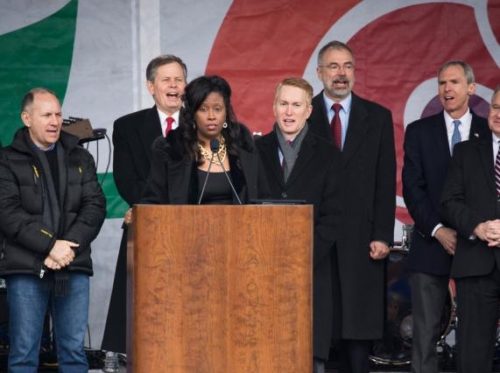NEW ORLEANS (CNS) — The Democratic state senator who wrote the Louisiana abortion law struck down by the U.S. Supreme Court June 29 said the ruling almost took her breath away.
“This is a decision that I holistically do not agree with. It’s a very disappointing decision,” Sen. Katrina Jackson said at a news conference in New Orleans.
Elected to the Louisiana Senate in 2020, she was a state representative when she wrote the 2014 Unsafe Abortion Protection Act, which the high court has deemed unconstitutional.
“It has been something today that has almost taken my breath away, that in America, at a time when we have advocated for access to health care and we have tried to ensure that people are qualified, that in the one area where women truly need qualified physicians, that the Supreme Court ruled against it,” she said.
She said that in Louisiana, radiologists and ophthalmologists have performed abortions. “We heard of a number of horror stories as this bill got out and circulated for years,” she said.

Many women, whether they were pro-life or they supported a right to abortion, told her, Jackson said, they agreed such a measure was needed to protect women, because “every woman who walks into an abortion clinic believes that she’s walking into the hands of an OB-GYN,” and that if there were complications, such as hemorrhaging, the abortion doctor would “provide a continuity of care and contact the hospital on her behalf.”
But that is not the case, Jackson said, and at least the suit over the law has “made women in Louisiana and all over the country realize that when you’re walking into abortion facilities, they’re not all the time walking in with qualified physicians who can follow the care if something happens. And that’s really big for me.”
“Even today,” she added, “I choose to still rejoice in the fact that we are still able to fight, that we’re still able to stand for women, of course.”
She said she is “holistically disappointed in the decision of the Supreme Court,” and she noted that in Louisiana, “when a man chooses to go an outpatient surgical center, ambulatory surgical center and have a vasectomy, that physician is required to have admitting privileges.”
But those safeguards are not afforded to a woman who “makes an unfortunate choice of an abortion” and “finds she’s walking into the hands of a physician that’s probably not qualified,” Jackson added.
She said a lot of people thought the Supreme Court was ruling on whether abortion was legal, but “no, they ruled against women’s health care. They ruled against qualified physicians being required.”
Jackson said she has “to be as real as I can be” about the court ruling. “I cannot placate it, and I cannot act like this was just a law we put in place. This was for citizens. This was to protect women. And that did happen.”
She said that “a Supreme Court woman who’s not elected decided that we can’t protect women in our state.” Jackson did not specify which woman justice; the three on the court, Justices Ruth Bader Ginsburg, Sonia Sotomayor and Elena Kagan joined Justice Stephen Breyer, who wrote the majority opinion in the case, June Medical Services v. Russo.
“That, for me, is a blow to all women, whether you’re pro-choice or pro-life,” Jackson continued. “They dealt a blow to women’s health care today and a standard that should be set. Our health care standards should be the same as those of men in this state and around the country. And so that’s why I’m just extremely disappointed.”
The Archdiocese of New Orleans echoed that disappointment over the high court striking down the law, which had never taken effect. It was challenged immediately in the courts after being signed into law by then-Gov. Bobby Jindal.
“This is very disappointing to us as people of faith who believe in the dignity of human life,” the archdiocese said about the Supreme Court’s decision. “We believed this law would have protected women from the possibility of harmful medical care preventing long-term health issues for them and saving lives.”
“As Catholics, we see abortion as an action that denies the fundamental human right to life and harms women physically, mentally and emotionally,” the archdiocese said in a June 29 statement. “We will continue to pray and fight for justice for mothers and children and offer them the support needed to choose life.”
The archdiocese also invited all people of faith “to pray for women seeking abortion, often under enormous pressure, that they will find alternatives that truly value them and the lives of their children.”
Joining Jackson at the news conference following the court handing down its ruling were Angie Thomas, associate director of Louisiana Right to Life; Cindy Collins, director of the Crisis Pregnancy Center in Slidell, Louisiana, who testified at the state Legislature in favor of this legislation; and Dorinda Bordlee, an attorney with Bioethics Defense Fund, who helped write the law with Jackson.
“The Supreme Court has continued its abortion distortion, that laws can apply to everyone except for the abortion industry,” said Thomas. “We’re also very disappointed that Supreme Court really didn’t even take on the standing issue. It was hardly considered.”
By “standing” she was referring to the issue the state of Louisiana had raised — but not answered by the court — as to whether a third party, in this case the abortion provider June Medical Services, had the right to challenge the law in the first place.
“Again, the legislative process and the will of the state was usurped by five judges,” Thomas added. “It was overwhelmingly passed. It was authored by women. It was written by women. It was the will of the state. And yet (with) the Supreme Court, a few people come in and strike it down.”
Collins said she had testified on the measure as a woman who’d had an abortion.
“And as I shared even before the court that the abortionist told me to get up, get out and keep quiet to shut up during the abortion procedure,” she said at the news conference. “And then afterward and I went outside on the bloody, bloody ground with my blood and the blood of my child.”
Her own abortion was”many years ago,” she explained. “But I have counseled hundreds of women now, if not thousands, that have had abortions, many of those from Louisiana.”
“The memories from that day are clear as ever,” Collins said of her abortion. “And I am disturbed daily and woken up by them almost nightly. And those are the voices that you’re not hearing, they are the voices of Louisiana women that were crying out for justice by what Senator Jackson brought forward and what we all went for.”
Bordlee in her remarks said the law “was supported by women and men, Republicans and Democrats, Black and white, across the board.”
About 95% “of everyone,” she said, “agreed that women deserve better than to be butchered and then abandoned by their doctors. And that’s what happened today. So it is a sad day for this country.”






















